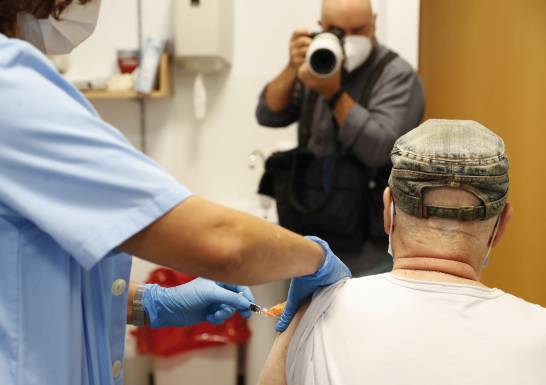An international research team led by Spaniards questioned, in an article published in Frontiers of Public Health, the distribution of vaccines against covid-19 between different countries and propose an algorithm to satisfy the properties that medical ethics considers essential. The study included Carlos Alós-Ferrer, from the Center for Neuroeconomics at the University of Zurich (Switzerland), Jaume García-Segarra and Miguel Ginés, economists at the Jaume I University of Castellón.
“Vaccine rationing procedures violated fundamental ethical principles”, emphasize the experts. In the article, they explain that these criteria were not taken into account in the allocation of vaccines, nor was the scientific advice of specialists in mathematics and economics, more accustomed to sharing scarce resources, necessary.
The distribution of vaccines did not comply with the ethical principles of rationing, nor did it rely on specialized advice
When COVID-19 vaccines became available, countries around the world scrambled to stock up on vaccines, with little or no intention of coordinating. To mitigate the potential chaos of these “health nationalist” policies, the World Health Organization and other institutions supported a multinational initiative called COVAX to coordinate the distribution of doses between different countries. Other supranational coalitions, such as the European Union, have also centralized the purchase of vaccines to distribute them among their member states.
Priority and equality
The first preference group must be fully immunized before moving on to the next
In the case of vaccines, two ethical principles are most important. First, to prevent a meltdown, medical personnel should be immunized first, then the elderly and those most at risk, and so on. This principle is called need-based prioritization and requires that preference groups be respected as decided by scientific evidence and competent medical authorities. That is, the immunization of a group should not begin until the previous ones are already immunized in all parts of the multiterritorial coalition.
Dose rationing protocol. / UJI
Second, all people within a given priority group must be treated equally. This principle is called equality between equals and seeks that people with the same priority have the same chances of receiving the vaccine, regardless of irrelevant factors such as, for example, which country or alliance state they reside in.
The lots were distributed proportionally to the population, not to each priority group, which varies from country to country
According to the researchers, “the allocation protocols applied by COVAX or the EU ignored scientific and ethical criteria”. Specifically, the error lay in applying a criterion of proportionality of lots based on the population of member states without taking into account that the proportion of priority groups was different in each one. “This meant that a younger and healthier population was vaccinated in some territories (with less priority), while in other territories there was still a more vulnerable population (and therefore with higher priority) without vaccinating”, they comment.
How to assign vaccines in the face of a pandemic
The problem can be solved using mathematical social science techniques. The research team has mathematically shown that there is one and only one way to allocate vaccines to ensure priority groups are respected and people within each group are treated equally. The procedure, called the Equal Priorities Protocol, is a little more complex than that applied by covid-19.
Group sizes for each country are calculated and stock is allocated to first priority groups evenly across all territories.
First, you must add up the size of each group across all territories. Then it measures how many groups can be fully serviced in the set of countries with the available stock. Thus, vaccines are evenly distributed in each state, according to the number of people who make up these groups in each territory.
This protocol has many other interesting additional properties that are explained in the appendix of the published article. For example, it cannot be manipulated before separations or unions between territories and the sequence in which the new doses are gathered does not matter.
The researchers say “the math shows that there is no other method that respects the two ethical principles we discussed and that any other protocol would violate at least one of these principles.”
The Equal Priorities Protocol is valid for any type of centralized distribution that must respect priority groups, for example, the distribution of iodine pills in the face of a nuclear threat, and they encourage the competent authorities to approve and put it into practice .
Reference:
Alós-Ferrer, C. Ethical allocation of scarce vaccine doses: The Priority-Equality protocol. Frontiers of Public Health (2022)
